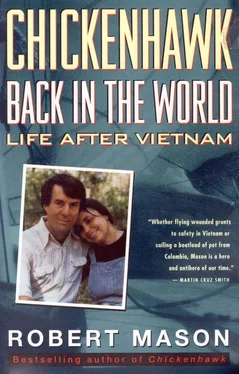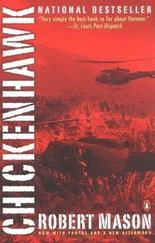Robert Mason - Chickenhawk - Back in the World - Life After Vietnam
Здесь есть возможность читать онлайн «Robert Mason - Chickenhawk - Back in the World - Life After Vietnam» весь текст электронной книги совершенно бесплатно (целиком полную версию без сокращений). В некоторых случаях можно слушать аудио, скачать через торрент в формате fb2 и присутствует краткое содержание. Год выпуска: 2013, Издательство: BookBaby, Жанр: Старинная литература, на английском языке. Описание произведения, (предисловие) а так же отзывы посетителей доступны на портале библиотеки ЛибКат.
- Название:Chickenhawk: Back in the World - Life After Vietnam
- Автор:
- Издательство:BookBaby
- Жанр:
- Год:2013
- ISBN:нет данных
- Рейтинг книги:3 / 5. Голосов: 1
-
Избранное:Добавить в избранное
- Отзывы:
-
Ваша оценка:
- 60
- 1
- 2
- 3
- 4
- 5
Chickenhawk: Back in the World - Life After Vietnam: краткое содержание, описание и аннотация
Предлагаем к чтению аннотацию, описание, краткое содержание или предисловие (зависит от того, что написал сам автор книги «Chickenhawk: Back in the World - Life After Vietnam»). Если вы не нашли необходимую информацию о книге — напишите в комментариях, мы постараемся отыскать её.
Chickenhawk: Back in the World - Life After Vietnam — читать онлайн бесплатно полную книгу (весь текст) целиком
Ниже представлен текст книги, разбитый по страницам. Система сохранения места последней прочитанной страницы, позволяет с удобством читать онлайн бесплатно книгу «Chickenhawk: Back in the World - Life After Vietnam», без необходимости каждый раз заново искать на чём Вы остановились. Поставьте закладку, и сможете в любой момент перейти на страницу, на которой закончили чтение.
Интервал:
Закладка:
“What the hell’s that?” Ireland said, pointing west.
John and I looked. A green oblong shape hovered twenty degrees above the horizon.
“Hey,” Ireland said, “I don’t believe in these things, but what—”
“Yeah,” John said. “Look at that. It’s moving.”
It was growing larger, looking very much like it was approaching us. I watched it, thinking there was something familiar about it. It suddenly moved back, getting smaller.
“Jesus,” Ireland said.
“It’s not a UFO,” I said. “I mean it is—UFO means it’s unidentified—but it’s not a ship, a spaceship, or anything—”
“Why are you always such a fucking cynic?” John said. “Big, bright green thing, hovering, comes at us, goes back, and you know it’s not a fucking flying saucer. Why?”
“Because it doesn’t act like a spaceship—”
“Oh,” John said, turning to Ireland. “Doesn’t act like a spaceship, Ramon.” Then he turned back to me. “What the hell you talking about?” John said, disgusted.
“She’s coming again,” said Ireland.
The shape seemed to rush toward us, getting huge. You still couldn’t see a surface or a clean edge, but the fact was, it was something coming our way. I really wanted it to be a spaceship. It dropped lower and seemed to be rushing us at low level, like a fighter on a strafing run. Then it changed course and swooped north, disappearing up among the stars in just seconds. I could feel John and Ireland staring at me. “Still,” I said. “There’s something not right about the way it flies.”
“Awww,” they groaned.
“So que is it?” Ireland said.
“I’m not sure. But it started out due west, right over Cape Canaveral.”
“It wasn’t a fucking rocket, Bob,” John said.
“No. But maybe they were testing something. Maybe they let some kind of gas out real high up, to check dispersion or something, I don’t know. But it looked like a gas cloud to me. It wasn’t moving, it was just getting bigger and smaller—”
“And then it rushed us—” John said, laughing.
“And then it got real big and finally collapsed,” I said. “It looked like it shot away, but it would look the same if it was a gas cloud that just shrank to nothing.”
“Awww,” they groaned.
We were listening to the news on a Miami radio station the next morning when we heard that John Lennon had been murdered. That put us all in a funk, pissed that weirdos like his killer were allowed to live at all; made us wonder at the fact that some people weren’t people, they just looked like people. We listened while they played “Imagine.”
A while later, we heard that NASA had released some weird green gas in the upper atmosphere over the cape, causing hundreds of UFO sighting reports. Ireland and John looked at me and said, “Awww.”
“Elephantshit!” Ireland yelled. “That’s what they always say.” We laughed.
By noon the winds were dying. The sea was sagging from riotous mountains to gentle dunes. John spent a lot of time trimming the sails, trying to coax as much energy as he could from the little wind that remained. The Namaste was doing two knots—a slow walk, and slowing.
“This is sailing,” John said. “One minute you’re on the verge of being sunk in a fucking storm, don’t know whether to shit or go blind, the next minute you’re looking for oars.”
As the wind died, Rosalinda became less effective. By sunset, Rosalinda’s wind vane flopped around uselessly and we steered by hand. Watching bits of seaweed crawl by, John said, “Well, fuck it. Let’s crank up the engine. That’s what it’s for.”
We dropped the sails and John started the engine. It ground a bit and finally caught. It was a Cummings thirty-horsepower diesel. The Namaste grumbled. I felt she did not like being pushed by a motor, but she cruised ahead anyway, muttering and vibrating. We could feel the breeze in our faces. It was a relief to be moving.
Under power, Rosalinda was completely useless. The relative wind she used as a reference to steer by was always coming from straight ahead, no matter what direction we motored. Rosalinda would just steer us in random directions, so we had to man the tiller during our watches. Sitting beside that big stick for four hours at a time, moving nitpick left, nitpick right, trying to keep the compass on the mark, made you really appreciate autopilots. John said that if he owned this boat, he’d have an electric autopilot installed for when he had to motor.
I woke Ireland at midnight for his watch. I went back on deck and waited by the tiller. So far, this trip was a pleasurable adventure. But I felt a chill when I thought about arriving at Saint Thomas. End of the cruise; beginning of the raid. Saint Thomas was the initial point, as we called it in Vietnam.
We’d drop low over the initial point, twenty of us—twenty helicopters—each carrying eight grunts. We flew at a hundred knots, but the Viet Cong almost always seemed to know our routes and would be there spraying red tracers into the flight. I heard: “Preacher Six, Preacher Red One. Red Two just went down. Two is down.” And Preacher Six, Major Rogers, said, “Roger. Mark the coordinates.” The pilot called in the coordinates where Red Two lay wrecked and we sped on, dodging palm trees, some of us thinking—me, for one—we were actually dodging the bullets; watching villagers, who we thought we were helping, shooting. Shooting at us.
Ireland came up through the hatch. I jerked, suddenly aware of where I was. I wondered if trying to write about Vietnam was such a good idea after all. Bad memories. So far, on the boat, I was sleeping well. I think the distractions of keeping the Namaste under way and the actual physical stress of the work were responsible.
Ireland sat beside me and asked how it was going. I looked at the compass and came right the ten degrees I’d dropped off, plus another five to make up for the loss. Luckily, the Namaste was slow. Minor course changes don’t mean much to a sailboat motoring at five knots. The engine vibrated my ass, the wake lapped along the hull, the prop wash fanned out behind the stem, glowing faintly with excited phosphorescent sea life being sucked through the propeller. The stars hovered so close I could touch them. Vietnam was so long ago, yet I could hear Preacher Six just then. I heard him.
The next morning, the engine quit.
“Fuel?” Ireland asked. “We out of fuel?”
“Naw,” John said. “We have fucking two hundred gallons in the tank.”
John pumped the throttle lever and pushed the starter button. Groan. Groan. Nothing. “Shit,” John said. “It’s a brand-new Cummings, goddammit.”
Ireland stayed on deck while John and I went below and removed the ladder so we could get to the engine compartment doors. We crawled in with a flashlight and stared at the engine. It was as big as a car engine. It was gray. It had lots of things sticking off it. John reached in and pressed a lever sticking off a mug-sized thing he said was the fuel pump. “Might’ve lost its prime,” he said, pumping the lever. He sat back on the cabin deck, grabbed his beer, and swigged. He yelled, “Give it a try, Ramon”
Groan. Groan. Spit. Growl. The engine chugged to life. We closed the doors, put the ladder back, and went above. John brought a couple of extra beers and Ireland and I lit up a joint. No engine means you drift around helpless for as long as God wants. It was a relief to hear the chugging and feel the vibration beneath our feet.
An hour later we heard: Sputter. Sputter. Sigh. Pop. Quit.
John leaned against the dodger frame and shook his head with his eyes closed. Ireland and I looked at each other and shrugged. The Namaste coasted and stopped. No wind. No waves. There were swells, though, probably leftover energy from the storm, and the Namaste rolled back and forth sickeningly. John had us raise the sails and pull them taut, to dampen the rolling. Now and then you could feel a whiff of breeze, but the weather vane on the masthead just swung and twirled as the boat rolled.
Читать дальшеИнтервал:
Закладка:
Похожие книги на «Chickenhawk: Back in the World - Life After Vietnam»
Представляем Вашему вниманию похожие книги на «Chickenhawk: Back in the World - Life After Vietnam» списком для выбора. Мы отобрали схожую по названию и смыслу литературу в надежде предоставить читателям больше вариантов отыскать новые, интересные, ещё непрочитанные произведения.
Обсуждение, отзывы о книге «Chickenhawk: Back in the World - Life After Vietnam» и просто собственные мнения читателей. Оставьте ваши комментарии, напишите, что Вы думаете о произведении, его смысле или главных героях. Укажите что конкретно понравилось, а что нет, и почему Вы так считаете.












